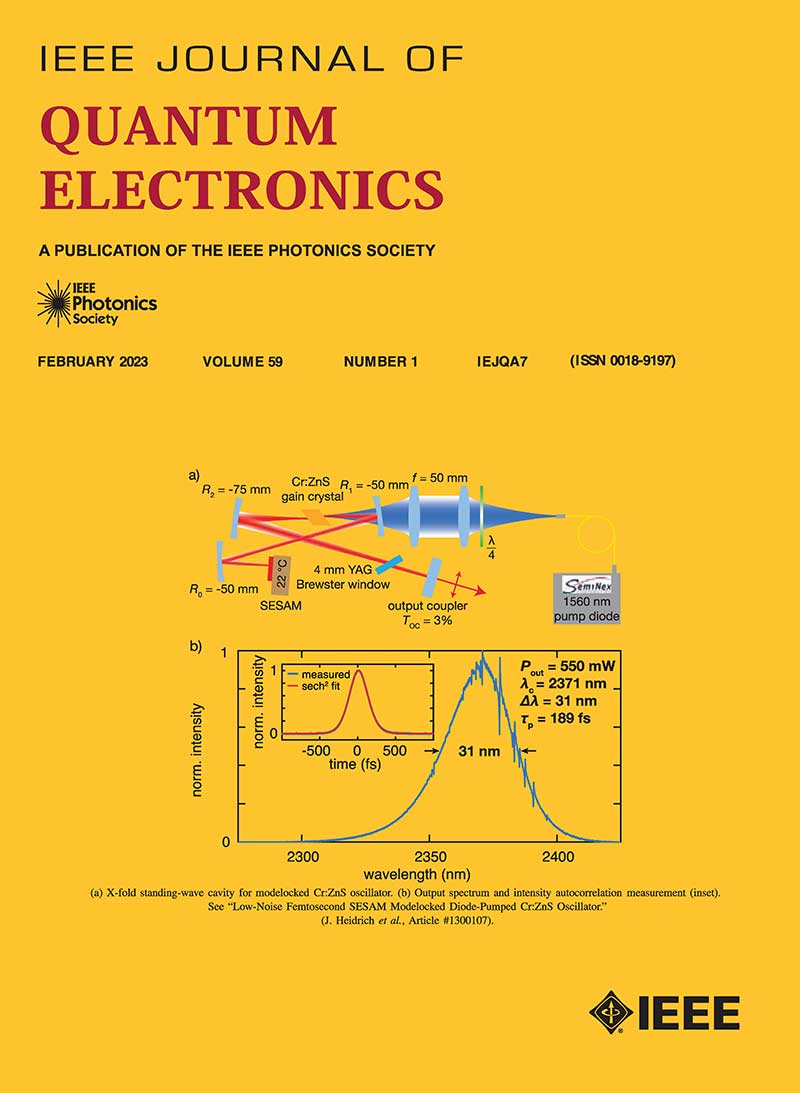Home / Publications / IEEE Journal of Quantum Electronics

The IEEE Journal of Quantum Electronics is dedicated to the publication of manuscripts reporting novel experimental or theoretical results in the broad field of photonics, which was originally known as quantum electronics at the time the journal was founded in 1965. The Journal publishes research papers concerning photons or electromagnetic waves with frequencies usually in the range of terahertz to petahertz, describing significant advances in their understanding or demonstration of new devices, systems, or applications.
16.4 weeks
Time to Publication
2.5
Impact Factor
OPEN CALLS FOR PAPERS
Information on upcoming publications with open paper and poster submissions for the IEEE Photonics Society.
Description
It is not sufficient for a paper to be merely technically correct. Papers that report improvements in the performance of well-known systems or devices or by clever electronics or mechanical engineering do not fall within the scope of JQE. Tutorial and review papers are by invitation only. If a manuscript is outside of the scope of JQE or other IEEE Photonics Society publications, it may be suitable for another IEEE Journal.
IEEE Tools for Authors offers a reference validation tool to check the format and completeness of references. Analyze your article’s LaTeX files prior to submission to avoid delays in publishing. The IEEE LaTeX Analyzer will identify potential setbacks such as incomplete files or different versions of LaTeX. The use of these tools simplifies the copy-editing process which in turn reflects into a faster time-to-publication. IEEE authors are eligible for discounts at several language editing services; visit IEEE Author Center to learn more. Please note these services are fee-based and do not guarantee acceptance.
All IEEE journals require an Open Researcher and Contributor ID (ORCID) for all authors. ORCID is a persistent unique identifier for researchers and functions similarly to an article’s Digital Object Identifier (DOI). ORCIDs enable accurate attribution and improved discoverability of an author’s published work. The author will need a registered ORCID in order to submit a manuscript or review a proof in an IEEE journal. Researchers can sign up for an ORCID for free via an easy registration process on orcid.org.
Learn more at http://orcid.org/content/about-orcid or in a video at https://vimeo.com/97150912.
Authors who do not have an ORCID in their ScholarOne user account will be prompted to provide one during submission.
The articles in this journal are peer reviewed in accordance with the requirements set forth in the IEEE Publication Services and Products Board Operations Manual (https://pspb.ieee.org/images/files/files/opsmanual.pdf). Each published article was reviewed by a minimum of two independent reviewers using a single-blind peer review process, where the identities of the reviewers are not known to the authors, but the reviewers know the identities of the authors. Articles will be screened for plagiarism before acceptance.
Submissions are reviewed by the Editorial Office for completeness and language proficiency. Submissions that are deficient will be sent back to the authors.
Upon submission, authors select a set of keywords that identify the topics of their paper. In turn, the list guides the Editorial Office on the selection of the Associate Editor who will handle the review process. Authors can track the status of their submission at any time through the IEEE Author Portal.
The use of artificial intelligence (AI)–generated text in an article shall be disclosed in the acknowledgments section of any paper submitted to an IEEE Conference or Periodical. The sections of the paper that use AI-generated text shall have a citation to the AI system used to generate the text.
Contributed papers are 8 pages double columned in length. For each page in excess of 8 pages, the cost of overlength charges imposed on the author is U.S. $220.00.
Invited papers are 12 pages, double columned in length. For each page in excess of 12 pages, the cost of overlength charges imposed on the author is U.S. $220.00.
John Dallesasse
University of Illinois at Urbana-Champaign, Illinois, USA
Email: jdallesa@illinois.edu
Giuseppe D’Aguanno, Johns Hopkins University, USA
Mable Fok, University of Georgia, USA
Xuhan Guo, Shanghai Jiao Tong University, China
Haroldo Hattori, University of New South Wales, Australia
Sushil Kumar, Lehigh University, USA
Ming Li, Chinese Academy of Sciences, China
Di Liang, University of Michigan, USA
Chien-chung Lin, National Taiwan University College of Electrical Engineering & Computer Science, Taiwan
Xingjie Ni, Penn State University, USA
Federica Poli, Unviersity of Parma, Italy
Varun Raghunathan, Indian Institute of Science, India
Sze Y. Set, University of Tokyo, Japan
Peter Vasil’ev, University of Cambridge and Lebedev Institute, United Kingdom
Nicolas Volet, Aarhus University, Denmark
Yating Wan, King Abdullah University of Science and Technology (KAUST), Saudi Arabia
Laura A. Lander
IEEE Photonics Society
445 Hoes Lane
Piscataway, New Jersey 08854, USA
Phone: +1 732 465 6479
Email: l.lander@ieee.org
This publication is a hybrid journal, allowing either Traditional manuscript submission or Open Access (author-pays OA) manuscript submission.
The OA option, if selected, enables unrestricted public access to the article via IEEE Xplore. The OA option will be offered to the author post-acceptance during final file submission. The traditional option, if selected, enables access to all qualified subscribers and purchasers via IEEE Xplore. No OA payment is required.
Fees:
For hybrid journals, the OA article processing fee is $2,495 USD plus other applicable fees (e.g., over-length paper charges and color page charges).
Discounts:
IEEE will apply a discount to current IEEE members. IEEE Members will receive a 5% discount, and members of IEEE Societies will receive a 20% discount. Discounts cannot be combined or applied to any other fees such as over-length article or color page charges.
© Copyright 2024 IEEE — All rights reserved. A not-for-profit organization, IEEE is the world’s largest technical professional organization dedicated to advancing technology for the benefit of humanity.